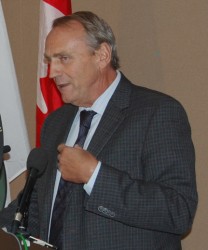Article Origin
Volume
Issue
Year
John Duncan has resigned his position as Canada’s Aboriginal Affairs and Northern Development minister, but it is not because of a near-riot in Saskatoon at the hotel hosting Duncan at his second First Nation Education Act consultation meeting on Feb. 8.
And it is not because of a charge of lack of consultation with First Nations on Bill C-27, the First Nations Financial Transparency Act, which is being discussed presently by the Senate Committee for Aboriginal Peoples.
And it is not because of Attawapiskat Chief Theresa Spence’s hunger strike or the grassroots Aboriginal movement that has formed under the Idle No More banner and which has swept the country in the last few months.
It is because Duncan wrote a character reference letter in June 2011 to the Tax Court of Canada on behalf of a constituent.
In a statement issued by Duncan on Feb. 15, the now former minister wrote “While the letter was written with honourable intentions, I realize that it was not appropriate for me, as a Minister of the Crown, to write to the Tax Court. I have therefore offered my resignation as Minister of Aboriginal Affairs and Northern Development to the Prime Minister, which he has accepted.”
The Assembly of First Nations had no immediate comment on Duncan’s resignation.
However, Perry Bellegarde, who serves as Saskatchewan Regional Chief with the AFN as well as head of the Federation of Saskatchewan Indian Nations, said he was “surprised.” He also charged the government with trying to temper the news of Duncan’s resignation by making the announcement on a Friday afternoon of a long weekend.
Bellegarde said Duncan’s resignation is an opportunity to get First Nations business back on track.
“Has he moved any issues? No. the record speaks for itself.”
Bellegarde points to cutbacks to the AFN and provincial, territorial organizations, the two per cent cap on increases to government funding, poor housing conditions, lack of access to adequate running water, and the education funding discrepancy between children receiving schooling on and off-reserve.
“Any time there’s change we have to seize it as an opportunity to really bring about transformational change,” said Bellegarde.
On Feb. 22, Harper appointed Bernard Valcourt as the new minister. Valcourt served as Associate Minister of National Defence.
In a news release, the Prime Minister’s Office stated Valcourt would “continue the government’s work to advance dialogue on Aboriginal issues and take achievable steps that will provide better education and economic outcomes for Aboriginal peoples across Canada.”
Bellegarde said the new minister needs to be able to lobby for Aboriginal rights and be committed to closing the socio-economic gap that exists between Indigenous and non-Indigenous people.
“I always say if the Cabinet mandate and political oversight from the Prime Minister’s Office to implement treaty and inherent rights in Canada’s own Constitution, meaning Sect. 35, which recognizes that existing greaty rights are affirmed through there, I think that’s the bigger piece to look at and focus on,” said Bellegarde.
In his resignation statement, Duncan said, “I have every confidence that the government will reach its goal of improving the lives of Aboriginal peoples across our country.”
Duncan will remain as MP for Vancouver Island North.
- 4680 views

